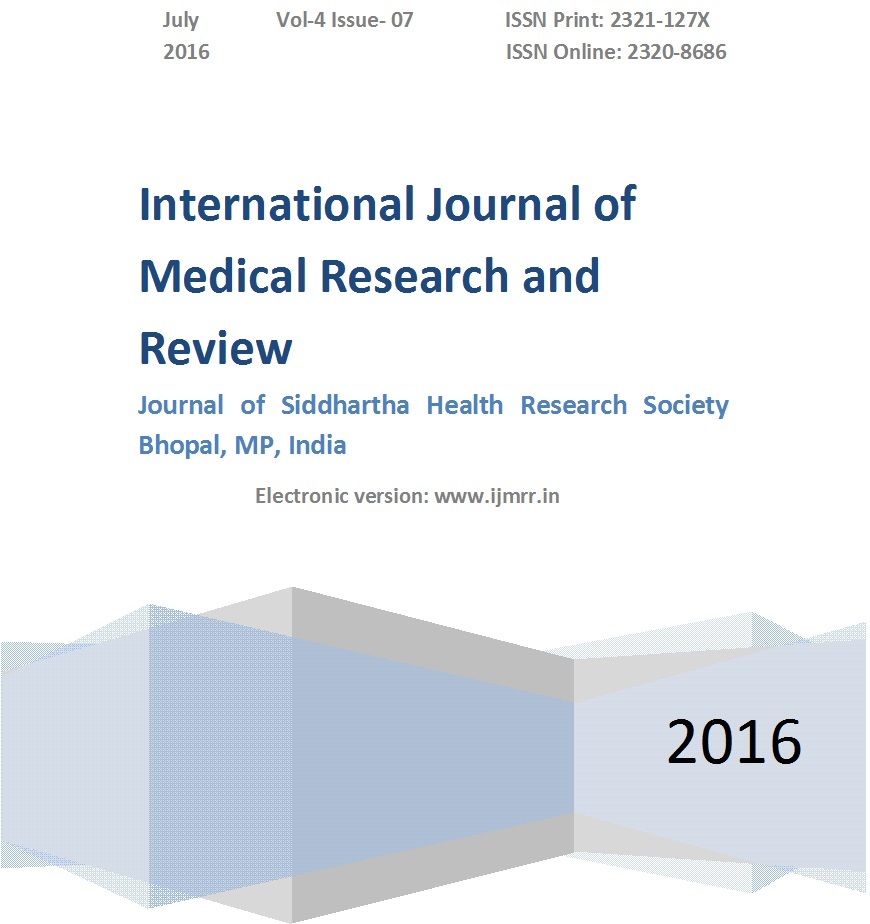Modified radical mastectomy for intraductal breast carcinoma in a patient with active pulmonary tuberculosis under thoracic epidural anaesthesia
Abstract
The incidence of breast carcinoma is on the rise in Asian countries like India and pulmonary tuberculosis is one of the most common infectious diseases encountered here. Although coexistence of active pulmonary tuberculosis and breast cancer in same patient is rare, it poses a huge challenge to the anaesthetist when patients having the above conditions concomitantly are posted for surgeries like mastectomy. Here we report the anaesthetic management of a case of breast carcinoma with active pulmonary tuberculosis managed successfully under thoracic epidural anaesthesia chosen to avoid major hemodynamic, respiratory and other complications like operation theatre pollution and drug interactions between anti tubercular and anticancer drugs and drugs used for general anesthesia.
Downloads
References
2. Asegaonkar BN, Zine SR, Takalkar UV, Kulkarni U, Asegaonkar SB, Kodlikeri P. Thoracic epidural anesthesia for modified radical mastectomy in carcinoma of breast patient with chronic obstructive pulmonary disease: A case report. International Journal of Case Reports and Images 2013;4(5):546–550.
3. Gaurav Agarwal and Pooja Ramakant. Breast Cancer Care in India: The Current Scenario and the Challenges for the Future .Breast Care (Basel). 2008 Mar; 3(1): 21–27.Published online 2008 Feb 22. doi: 10.1159/000115288 PMCID: PMC2931014
4. Kamboj M, Sepkowitz KA The risk of tuberculosis in patients with cancer. Clinical Infect Dis jun 1; 42(11): 1592-1595.Epub 2006 Apr 27 PMID-16652317
5. Huh J, Kang SS. Bronchial bleeding induced by suction in a patient with bronchial anthracofibrosis.Korean J Anesthesiol. 2004; 46:624–627
http://critical.med.ualberta.ca/FileArchive/~/media/criticalcare/Documents/Causesandmanagementofmassivehemoptysis.pdf
7. Jackson TA, Thomas JM, South Afr .Tuberculosis: the implications for anaesthesia J Anaesth Analg 2013; 19(6):301-305
8. Fromm MF, Eckhardt K, Schanzle G, et al. Loss of analgesic effect of morphine due to coadministration of rifampicin. Pain 1997; 72(1-2):261-267.
9. Burkett L, Bikhazi GB, Thomas KC Jr, et al. Mutual potentiation of the neuromuscular effects of antibiotics and relaxants. Anesth Analg. 1979 Mar-Apr;58(2):107-15.
10..Belzarena SD Comparative study between thoracic epidural block and general anesthesia for oncologic mastectomy.
Rev Bras Anestesiol. 2008 Nov-Dec;58(6):561-8
11. Tanaka K, Watanabe R, Harada T, Dan K . Extensive application of epidural anesthesia and analgesia in a university hospital: incidence of complications related to technique.. Reg Anesth. 1993 Jan-Feb;18(1):34-8.
12. E P Lynch, K J Welch, J M Carabuena, and T J Eberlein. Thoracic epidural anesthesia improves outcome after breast surgery Ann Surg. 1995 Nov; 222(5): 663–669.
13. Exadaktylos AK, Buggy DJ, Moriarty DC, et al. Can anesthetic technique for primary breast cancer surgery affect recurrence or metastasis? Anesthesiology 2006; 105:660-4. PMID – 17006061.
14. O’Connor PJ, Moysa GL, Finucane BT. Thoracic epidural anesthesia for bilateral reduction mammoplasty in a patient with Klippel-Feil syndrome. Anesth Analg 2001; 92(2):514–6.PMID-11159260.
15. Sundarathiti P, Pasutharnchat K, Kongdan Y, Suranutkarin PE. Thoracic epidural anesthesia (TEA) with 0.2% ropivacaine in combination with ipsilateral brachial plexus Block (BPB) for Modified Radical Mastectomy (MRM). J Med Assoc Thai 2005; 88(4):513–20.PMID -16146257.
16. Popping DM, Elia N, Marret E, Remy C, Tramer MR. Protective effects of epidural analgesia on pulmonary complications after abdominal and thoracic surgery: a meta-analysis. Arch Surg 2008 Oct; 143(10):990–9.PMID-18936379.
17. E Coveney, C R Weltz, R Greengrass, J D Iglehart, et al. Use of paravertebral block anesthesia in the surgical management of breast cancer: experience in 156 cases. Ann Surg.1998 Apr; 227(4); 496-501.PMID-9563536.



 OAI - Open Archives Initiative
OAI - Open Archives Initiative


